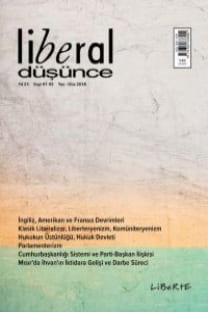Hukuk Devleti ve Hukukun Üstünlüğü Kavramları: Albert Venn Dicey ve Hans Kelsen
Hukukun üstünlüğü (rule of law) ve hukuk devleti (Rechtsstaat) kavramları çoğu zaman eşit anlamda kullanılmaktadır. İkisinin de hukuka hâkim olan ilkelerden olması, onların çoğu zaman birleştirilerek kullanılmasına neden olmaktadır. Hâlbuki hukukun üstünlüğü (rule of law) ve hukuk devleti (Rechtsstaat) zannedildiği gibi aynı çatı altında kullanılamaz çünkü ikisi de temelleri bakımından farklı felsefî arkaplanlara sahiptir.Bu metinde bu iki kavramın ait olduğu iki farklı hukukî-felsefî kültür karşılaştırılacaktır. Hukukun üstünlüğü Anglo-Sakson anlayışına tâbidir ve siyasidir. Oysa hukuk devleti (Rechtsstaat) anlayışı Alman ekolünden gelmektedir ve içerik olarak daha normatiftir (hukukidir). Bu sisteme göre hukuk kuralları tüm hayatımızı etkilemektedir ve hukuk kurallarına olan bağlılık bize özgürlük getirmektedir.Sonuç olarak, bu iki kavram arasındaki farklılıklar ve benzerlikler, anayasa ve hukukun üstünlüğü veya hukuk devleti anlayışını temsil eden A.V. Dicey ve Hans Kelsen’in görüşleri ekseninde ortaya konulacaktır.
Anahtar Kelimeler:
Hukukun Üstünlüğü, Hukuk Devleti, A.V. Dicey, Hans Kelsen
___
- BARBER, Nicholas W.,”The Rechtsstaat and the Rule of Law”, The University of Toronto Law Journal, Toronto, 2003, cilt: 53, Sayı: 4, ss: 443-454.
- BLAAU, Loammi C.,“The Rechtsstaat Idea Compared with the Rule of Law as a Paradigm for Protecting Rights”,S. African LJ,1990, Sayı: 107, ss: 76-96.
- CHROUST, Anton-Hermann. “Some German Definitions of Law and Legal Philosophy from Kant to Kelsen”,Notre Dame Law Review, Indiana 1946, cilt: 22, Sayı: 4, ss: 365- 399.
- COSGROVE, Richard A.,The Rule of Law: Albert Venn Dicey, Victorian Jurist, UNC Press Books, North Carolina 2017.
- DICEY, Albert V.,The Law of the Constitution. Vol. 1, OUP Oxford, Oxford 2013.
- DICEY, Albert V.,Lectures on the Relation between Law and Public Opinion in England during the Nineteenth Century, Liberty Fund, Indianapolis 2008.
- DYZENHAUS, David. “Austin, Hobbes, and Dicey”. Canadian Journal of Law & Jurisprudence, 2011, Sayı: 24, ss: 409–430.
- DYZENHAUS, David,“Hobbes and the Legitimacy of Law”,Law and Philosophy, 2001, cilt: 24, Sayı: 5,ss: 461–498.
- DYZENHAUS, David ve diğerleri (edit.), Hobbes and the Law, Dyzenhaus, D.:“Hobbes on the Authority of Law”,pp. 186-209, Cambridge University Press, Cambridge 2012.
- EBERLE, Edward J. “The German Idea of Freedom”, Roger Williams University School of Law,Faculty Papers Paper 13”,2007, http://lsr.nellco.org/rwu_fp/13
- GEBAUER,Annekatrin,“Der, Unzähmbare “Leviathan Rechtsstaatlichkeit Und Natürliche Gesetze Bei Thomas Hobbes”, Archiv Für Rechts-Und Sozialphilosphie,Stuttgart 2005, Cilt: 91, Sayı: 2, ss: 239–255.
- GEORGE, William H.,“Auguste Comte: Sociology and the New Politics”, American Journal of Sociology, 1927, Sayı: 33, ss: 371–381.
- GRAY, John ve diğerleri (edit.), On Liberty, Routledge, London 1991.
- HIBBITTS, Bernard J., “The Politics of Principle: Albert Venn Dicey and the Rule of Law”, Anglo-Am. L. Rev., 1994, Cilt: 23, ss: 1- 31.
- HOBBES, Thomas,Leviathan, Scientia-Verlag, London 1839.
- HOBBES, Thomas: Leviathan (Longman Library of Primary Sources in Philosophy). Routledge, 2016.
- KANT, ImmanuelPratik Aklın Eleştirisi, Ioanna Kuçuradi ve diğerleri, Türkiye Felsefe Kurumu, Ankara 1994.
- KELSEN, Hans, General Theory of Law and State. Routledge, 2017.
- KELSEN, Hans, Pure Theory of Law. University of California Press, Berkeley 1967.
- KORS, Alan C.,“The Paradox of John Stuart Mill”,Social Philosophy and Policy,Cambridge 2011, Cilt: 28, Sayı: 2, ss: 1- 18.
- LASLETT, John (Ed.), “Locke: Two Treatises of Government (Cambridge Texts in the History of Political Thought)”, Cambridge University Press, Cambridge 1988.
- LASSALLE, Ferdinand,Qu’est-Ce Qu’une Constitution?Editions Sulliver, Arles 1999.
- LEWISOHN, David, “Mill and Comte on the Methods of Social Science”,Journal of the History of Ideas, Pennsylvania 1972, Cilt: 33, Sayı: 2,ss: 315–324.
- MACCORMICK, Neil D.,“Der Rechtsstaat Und Die Rule of Law”,Juristenzeitung,1984, Cilt: 20, ss: 65–70.
- MACPHERSON, Crawford B.,The Political Theory of Possessive Individualism: Hobbes to Locke,Oxford University Press, Ontario 2010.
- MMILL, John S.,The Positive Philosophy of Auguste Comte. Henry Holt and Company, New York 1873.
- MISSNER, Marshall,Thomas Hobbes: Leviathan (Longman Library of Primary Sources in Philosophy), Routledge, New York 2016.
- PATAPAN, Haig,“The Author of Liberty: Dicey, Mill and the Shaping of English Constitutionalism”,Public Law Review, 1997, Cilt: 8, Sayı: 4, ss: 256-269.
- RAEDER, Linda C., John Stuart Mill and the Religion of Humanity, University of Missouri Press, Colombia 2002.
- SCHARFF, Robert C.,“Positivism, Philosophy of Science, and Self-Understanding in Comte and Mill”,American Philosophical QuarterlyIllionis 1989, Cilt: 26, Sayı: 4, ss: 253– 268.
- TREMBLAY, Luc B.,Rule of Law, Justice, and Interpretation, McGill-Queen’s Press-MQUP, Montreal 1997.
- WALTERS, Mark, “Legality as Reason: Dicey, Rand, and the Rule of Law”McGill Law Journal/Revue de Droit de McGill,Montreal 2010, Cilt:55, Sayı: 3,ss: 563–586.
- WHITESIDE, Kerry H., “Hobbes’s Ultranominalist Critique of Natural Right”,Chicago 1988, Polity, Cilt: 20, Sayı: 3 ss: 457–478.
- WRIGHT, Terence R.,“The Religion of Humanity: The Impact of Comtean Positivism on Victorian Britain”, Paperback, New York 1986.
- YOVEL, Yirmiyahu,“Kant’s Practical Reason as Will: Interest, Recognition, Judgment, and Choice”,The Review of Metaphysics, Richmond 1998, Cilt: 52, Sayı: 2, ss: 267–294.
- ISSN: 1300-8781
- Başlangıç: 1996
- Yayıncı: Liberte Yayınları
Sayıdaki Diğer Makaleler
Mısır’da İhvan-ı Müslimin’in İktidara Geliş Süreci ve Temmuz Darbesinin Nedenleri Üzerine
Liberteryen Teoride Özgürlüğün ve Siyasetin Sınırları
Schmitt’in Hayaleti ve Parlamentarizmin Krizi
Edmund Burke’ten Hareketle Devrim Eleştirisi
Liberal - Komüniteryen Tartışması
Devlet Başkanı ve Siyasî Parti İlişkisi Üzerine
Locke’un Siyasal Zoolojisi: Yasa, Hayvan ve Egemen
Hukuk Devleti ve Hukukun Üstünlüğü Kavramları: Albert Venn Dicey ve Hans Kelsen
İngiliz ve Amerikan Devrimlerine Fransız Devrimi Üzerinden Bir Bakış
